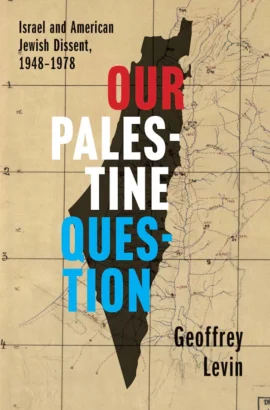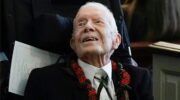In “Our Palestine Question,” Geoffrey Levin, assistant professor of Middle Eastern and Jewish studies at Emory University, recovers the voices of those Jews who first called for an honest reckoning of the plight of Israel’s Palestinian population…
by Allan C Brownfeld. This article will appear in the Spring-Summer ISSUES, the quarterly journal of the American Council for Judaism.
A review of “Our Palestine Question: Israel and American Jewish Dissent, 1948-1978” by Geoffrey Levin, Yale University Press, 320 pages, $38.
At the present time, Israel’s treatment of Palestinians is very much in the news, not only what is taking place in Gaza, but developments in the occupied West Bank and within Israel itself. Many are unaware of the fact that American Jews have a long history of debating issues relating to the rights of Palestinians. Significant Jewish voices have been harshly critical of Israel’s approach to Palestine’s indigenous population from the very establishment of the state in 1948.
In “Our Palestine Question,” Geoffrey Levin, assistant professor of Middle Eastern and Jewish studies at Emory University, recovers the voices of those Jews who first called for an honest reckoning of the plight of Israel’s Palestinian population.
In the Introduction, Levin cites the visit in 1953 of Rabbi Morris Lazaron, an early leader of the American Council for Judaism, to the Shatila refugee camp. There, he witnessed “firsthand the suffering of Palestinian families who had lost their homes during the war that accompanied Israel’s creation in 1948. The ‘illimitable misery’ of the refugees, to use Lazaron’s words, had a decisive impact on the former head rabbi of the prestigious Baltimore Hebrew Congregation. After his trip, Rabbi Lazaron began calling on the Israeli government to recognize the right of Palestine’s Arab refugees to return to their pre-war homes and urged the Jewish state to admit 100,000 of them into the country immediately.”
American Jews Deeply Unsettled By Israeli Policies
Levin points out that, “Ever since an estimated 750,000 Palestinians lost their homes amidst Israel’s birth in 1948, there have been American Jews deeply unsettled by Israeli policies toward both the Palestinian refugees and Arabs living under Israeli rule. These critics of old did not consist only of a few stray rabbis like Morris Lazaron but in fact extended well into the American Jewish establishment — including leaders and staff members of the American Jewish Committee (AJC). The collective amnesia with regard to this history has been complete…”
Zionism, as implemented in Israel, Levin points out, “contradicted some of the core values that American Jews had championed in their push for an inclusive America…Israel prioritized Jewish interests over the needs of non-Jews born in the lands it controlled. This was clear in its immigration policy which welcomed all Jews while preventing Palestinian refugees from returning to their homes…Until 1966, Israel’s Arab minority, despite receiving Israeli citizenship in 1952, faced many onerous military government restrictions that Jewish Israelis barely knew about.”
Slowly, Levin notes, American Jewish organizations began to yield their autonomy to the Israeli state. What this required, he argues, was that “these organizations turn away from a distinctive American Jewish identity as a historically, dispossessed minority that has thrived in a liberal secular state and instead adopt the values of Israel, a country premised on meeting the needs of an ethno-national majority…Is the core of Jewish identity remembering that ‘we were once strangers in the land of Egypt’? Or is it all about maintaining a restored Kingdom of David.”
Refugees Are Denied The Right To Return
After 1948, there was a Jewish state that ruled over a non-Jewish minority group and denied refugees the right to return to their homes on the basis of religion and ethnicity. This, Levin writes, “created a sense of cognitive dissonance for these American Jewish organizations.” In the case of the then non-Zionist AJC, Levin points out, its concern “stemmed in part from its leadership’s belief that Jews were solely a religious group…But it also came amidst fears that Zionism would potentially raise doubts about American Jews’ loyalty to the United States…this concern prompted AJC president Jacob Blaustein to compel Israeli Prime Minister Ben-Gurion to ‘clarify’ that Israel made no claims on the political loyalties of non-Israeli Jews in an agreement known as the 1950 Blaustein—Ben-Gurion ‘exchange of views.’”
Today, many are unaware that Jewish Americans have a long history of debating issues related to the rights of Palestinians. In this book, Levin recovers the voices of those Jews who first called for an honest reckoning of the plight of the indigenous population of Palestine. He highlights the role played by the American Council for Judaism, which was established in 1942 by a group of Reform rabbis unsettled by their denomination’s endorsement of Zionist aims. The Council envisioned Palestine’s future as a nonsectarian democracy for all its citizens. It encouraged U.S. leaders to coordinate with the U.N. to settle displaced Holocaust survivors in countries throughout the world.
Levin tells the story of a number of Jewish Americans who embraced Palestinian rights, including academic Don Peretz, journalist William Zukerman, Rabbi Elmer Berger, and philanthropists James Marshall and Lessing J. Tosenwald.
Dissertation on Palestinian Refugees
In the case of Peretz, he arrived as a 26-year old in Israel, a young U.S. Army veteran on his way to deliver aid to recently displaced Palestinians as part of a mission for the Quaker-affiliated American Friends Service Committee. When he returned to New York, he enrolled in Columbia University and began work on his doctoral dissertation on the Palestinian refugee question. He was soon hired by the AJC, then proclaiming itself a “non-Zionist” group, and became the organization’s first Middle East consultant. He was told to put together an Arab refugee relief initiative with humanitarian aims. Levin points to the fact that the government of Israel soon became aware of this project and that “Israeli diplomats would initiate a quiet campaign to undermine the AJC refugee relief initiative and its creator, with the aim of ejecting Peretz from the organization.”
Peretz detailed Israel’s inflexible position and its blaming of the refugee problem on Arab leaders ordering evacuations of Palestinian towns and villages in 1948, for which no evidence was ever provided and Israel’s own “new historians” later showed was without any foundation. As a result of constant Israeli pressure, the AJC ultimately ended its relationship with Peretz and joined other Jewish organizations in embracing Zionism.
Levin also tells the story of former Yiddish journalist William Zukerman, who started an English-language newslettter supported by the American Council for Judaism and to which Peretz would become a regular contributor. Zukerman’s concern about Zionism went back many years. In April 1934, he wrote in the Nation that “Jewish fascism was poised to take over the Zionist movement.” In the Jewish Newsletter in September 1950, he wrote: “The question of the Arab Refugees is a moral issue which rises above diplomacy…The land now called Israel belongs to the Arab Refugees no less than any Israeli. They have lived on that soil and worked on it…for twelve hundred years…The fact that they fled in panic (during the 1948 war) is no excuse for depriving them of their homes.”
Zukerman’s Jewish Newsletter
Zukerman’s Newsletter, writes Levin, “stood as the only Jewish newspaper in the United States that consistently and sympathetically covered the Palestinian refugee problem throughout the 1950s. Israeli archival sources show that future ambassador Avraham Harman and other Israeli diplomats pushed for a concerted campaign to isolate Zukerman who they claimed was ‘confusing Zionists’ through his nuanced journalism. Their effort succeeded in minimizing Zukerman’s profile in the American Jewish press, depriving mainstream Jewish readers of any credible voice critiquing Israel’s policies toward the Palestinians.”
Israel viewed Peretz and Zukerman as critics to be eliminated, and American Zionists fell into line. “Israeli diplomats,” notes Levin, “felt compelled to act against American Jewish dissenters…His (Zukerman’s) case proves that the diplomatic discussions about Peretz were not isolated incidents but rather part of a pattern that actually preceded the Peretz affair and involved other high ranking Israeli diplomats. Not only did Zukerman’s relative moderation in the Newsletter’s early years fail to inoculate him against Israeli criticism, but the fact that parts of the mainstream Jewish community accepted him made Israeli officials view Zukerman as particularly ‘dangerous’ and inspired them to act against him.”
A significant portion of this book deals with the role played by the American Council for Judaism. Levin writes, “Ideologically, the Council emerged from a long history of Reform Jewish rejection of Jewish nationalism…In 1885, leading Reform rabbis meeting in Pittsburgh released a statement that, among other things, distanced themselves from the protocol-Zionist movement emerging in Europe…The document declared, ‘We consider ourselves no longer a nation, but a religious community.’…These Reform Jews…claimed to feel fully American and conceptualized Judaism as a religion, not a nationality or race.”
Formation of American Council for Judaism
When the Central Conference of American Rabbis moved toward embracing Zionism in 1942, a group of rabbis met in Atlantic City, New Jersey to formulate a response. “They soon decided to form a formal organization,” writes Levin, “which they called the American Council for Judaism. The name reflected the rabbis’ emphasis on ‘American’ as their only national identity and as ‘Judaism’ as solely a religious identity. The rabbis then selected one of their youngest and most enthusiastic members, thirty-four-year-old Elmer Berger of Temple Beth-El of Flint, Michigan to serve as the Council’s executive director.”
Berger’s early works, Levin shows, expanded on Classical Reform arguments. His 1945 book, “The Jewish Dilemma,” exemplified the Council’s ideology. Divided into three parts, the book put forth a narrative of Jewish history that “idealized ‘prophetic Judaism’ and Jewish integration. Berger argued that Jews did not comprise a race or a people at all, but merely differed from others in terms of their religious creed…In a second book published in 1951, ‘A Partisan History of Judaism,’ Berger expanded on this critique, bemoaning ‘the tragic acceptance of Hitler’s racist twaddle’ in America as playing into the hands of Zionists. Instead of responding to Nazism by further embracing democratic ideals, Berger accused Zionists of accepting ‘Hitler’s decree of separatism and try(ing) to make of it a virtue and to use it as political capital to win a ‘Jewish’ state. In short, this pillar of Council ideology portrayed Zionism as a betrayal of Jewish history and religion, provincializing Judaism’s universal message.”
In 1949, Council president Lessing J. Rosenwald sent an open letter to American religious groups calling for Arab refugee “repatriation” and “resettlement,” urging interfaith cooperation in a program to cope with the “desperate flight of some 750,000 refugees who have been rendered homeless by the recent hostilities in Palestine.” He issued this call along with a letter to Secretary of State Dean Acheson urging greater aid for Arab refugees.
American Friends of the Middle East
Rabbi Berger was active in Americans Friends of the Middle East (AFME), which led to his relationship with Fayez Sayegh, who headed the Arab Jnformation Office in New York. Berger also became close to Dorothy Thompson, the prominent anti-Nazi journalist who later became an advocate for Palestinian rights and was a leading member of AFME, which was partially financed by the C.I.A. to counterbalance the weight of the pro-Israel lobby.
The first term of President Eisenhower, Levin points out, “marked the pinnacle of Council influence in Washington, aided by the administration’s hopes of forging a partnership with Egypt, which it presumed required pressuring Israel to make concessions. In April 1953, Council president Lessing Rosenwald met with an ‘extremely attentive’ President Eisenhower who gave ‘the impression that what he heard was in general agreement with his views.’ The meeting may have contributed to the sentiments behind Eisenhower’s October 1953 observation that ‘the political pressure from the Zionists in the Arab-Israeli controversy is a minority pressure. My Jewish friends tell me that except for the Bronx and Brooklyn the great majority of the nation’s Jewish population is anti-Zionist.’ Secretary of State Dulles, on his first tour of the Middle East, reportedly took with him Council material that Rosenwald had given Eisenhower. Upon his return, Dulles’s speech calling for a more evenhanded U.S. policy toward the region ‘contained passages that bore a striking resemblance to Council proclamations.’” (Quotes from “America’s Great Game” by Hugh Wilford)
During the Eisenhower administration, Levin writes, “A close relationship developed between Assistant Secretary of State for Near Eastern, South Asian and African Affairs Henry Byroade and Berger. Berger had a hand in two of Byroade’s speeches in 1954. Byroade called on Arabs to accept Israel’s existence and on Israel to ‘drop your conqueror attitude and see your future as a Middle East state and not as a headquarters of worldwide groupings of people of a particular religious faith who must have special rights within and obligations to the Israeli state.’ This statement echoed the typical Council rhetoric.”
Breira Opposes a Israeli Occupation
Also discussed is the group Breira, which attracted left-wing Jews including Noam Chomsky and Israeli Knesset member Uri Avnery. Breira, Levin points out, was the “first national American Jewish organization to openly oppose Israel’s occupation of the West Bank and Gaza…Breira spoke openly about the needs of the Palestinians while attempting to maintain legitimacy in the broader Jewish community by arguing that Palestinian statehood served Israeli interests. With a very active fifteen hundred members, including over a hundred rabbis, and chapters in cities throughout the country, the group had some success. But as Breira’s image increasingly became identified with the Palestinian question, it faced growing pushback that would ultimately overwhelm it.”
Founded in 1973, Breira — the Hebrew word Breira literally means “choice” or “alternative” — quickly attracted attention. Levin notes that the group won the support “of many rabbis and other Jewish communal professionals, including former American Jewish Congress Rabbi Joachim Prinz, a co-organizer of Martin Luther King’s 1963 March on Washington, who agreed to join the group’s board…Rabbi Balfour Brickner of the Union of American Hebrew Congregations and Rabbi Arnold Wolf, a Yale University chaplain known for his civil rights advocacy, who became chair of the organization.”
In December 1973, Breira spoke publicly of the need for Israel to make territorial concessions and “recognize the legitimacy of the national aspirations of the Palestinians.” The group soon moved toward openly supporting a group of Israeli dovish voices that increasingly supported negotiations with the PLO. In late 1974, Arnold Wolf — writing as a member of Breira’s advisory committee, as he had not yet been named the group’s chair — published a short article in Sh’ma titled “Toward Peace with the PLO” outlining the case for negotiations and what a two-state solution would look like. He called on American Jews to promote constructive dialogue between Israel and the Palestinians. Should another war come, Wolf argued, “Israel must have proven…that no stone was left unturned in its search for peace. The last, the heaviest, the most unyielding stone is the PLO. American Jews could, if we have the strength, help to raise it while there is still time.”
Breira Faces Resistance
Levin provides this assessment of the difficulty Breira faced in opening the Jewish community to constructive dialogue: “The initial Breira position of ‘introducing’ the American Jewish community to Israeli dovish views may sound modest, but at the time, even this appeared challenging. Earlier in the seventies, future Breira members faced considerable resistance from mainstream Jewish groups when organizing tours for Israelis. For example, in 1970, when left-wing Knesset member Uri Avnery came to the United States to tour Jewish institutions, the Anti-Defamation League (ADL) sent fliers critical of Avnery to those who had agreed to host him, prompting almost all to cancel. Later, that year, Rabbis Michael Robinson and Everett Gendler failed to persuade the Jewish Peace Fellowship to sponsor a national speaking tour for Israeli pacifist Uri Davis. Similarly, when Israeli Arab Fawzi El-Asmar was on his way to North America for a speaking tour, a Commentary article by Alan Dershowitz justifying Israel’s ‘preventive detention’ of El-Asmar was circulated widely among Jewish groups leading to many cancellations.”
Though Breira came to an end, in part because of the influence of the Israeli government to isolate it from the organized American Jewish community, similar organizations slowly began to come into being. Levin notes that, “Breira, the first national American Jewish organization to openly oppose Israel’s occupation of the West Bank and Gaza, was far from the last of its kind. Other groups with similar platforms that emerged after Breira included New Jewish Agenda…established in 1980, Americans for Peace Now, established in 1981; and J Street, created in 2007…Breira remains an American story…it is also part of the Israeli and Palestinian histories, not only because it aimed to influence those two peoples, but also because Israelis and Palestinians influenced it…”
In his concluding chapter, Levin recalls the day, 0ctober 19, 2001, when seventy-eight year old Don Peretz received the Middle East Institute award in a televised event: “As the mainstream American Jewish community had never celebrated Peretz, it seems appropriate that the honor took place at a meeting of the policy-focused think tank that had published Peretz’s earliest research on Israel/Palestine. After being introduced by Assistant Secretary of State William Burns (now Director of the C.I.A.), Peretz thanked the distinguished audience…He quoted a speech that he had heard more than half a century earlier…Judah Magnes’s 1947 welcome address to Hebrew University students, which the university president had delivered only weeks before the outbreak of a war that reshaped the trajectories of Jewish and And Palestinian histories.”
Force And Violence Is Idolatrous
Quoting Magnes, Peretz stated: “What is the duty of the man, more especially of the teacher, who thinks the method of force and violence to be a savage and idolatrous belief? Is there room for that man in our society? Is it his right, or even perhaps his duty, to express an opinion which may differ from the majority decision of official institutions? Is one to sanctify these majority decisions above every other sacred thing? More than that, is there not laid upon the man the sacred task, despite majority decisions, to warn the people, to teach, to point to its error — nay, perhaps even its iniquity — when its words lead to the destruction that may overtake the people of the land?”
The speech concludes: “Is there no place in our society for those who dissent from the decisions of the majority and who, conscious of their collective responsibility, obey the command of conscience by lifting their voice, not for murder and destruction, heaven forbid, but for peace and understanding among the peoples?”
Peretz did not merely mention Magnes but, Levin notes, “He had selected a quotation from him about the crisis of dissenters who felt that their society had chosen the wrong path. Is there room, they asked, ‘for those who dissent from the decisions of the majority and…obey the command of conscience by lifting their voice…for peace?’ Peretz made his speech an ode to Magnes, but he could just as well be speaking of his own experience.”
Don Peretz
This book ends, writes Levin, as it began, “recalling the story of Don Peretz. From the 1940s through the 1970s, Peretz had links to nearly every American Jewish effort supportive of Palestinians. In summer 1948, Peretz became involved with a transnational network of dovish figures including Hannah Arendt, Judah Magnes, Hans Kohn and James Marshall, a group that after Magnes’s passing morphed into the Judah L. Magnes Foundation, which funded scholarships for Arab university students in Israel.”
Later, Peretz worked for the AJC on its Arab refugee initiative and wrote on Palestinian affairs for William Zukerman’s Jewish Newsletter. After 1967, he served on the steering committee of New Alternatives for the Middle East along with Noam Chomsky and then joined Breira’s executive committee. Peretz befriended Rabbi Elmer Berger and Norton Mezvinsky, who served as executive director of the American Council for Judaism. Peretz wrote the forward for Elmer Berger’s final book.
Levin believes that members of contemporary pro-peace Jewish groups would feel that they have much more in common with Don Peretz than with the average Jewish American of Peretz’s generation who, in most cases, donated to Israel but never spent much time there. Today, Levin declares, “There are many young American Jewish ‘Don Peretzes,’ and many of them are at work in groups that might be considered Breira’s successors.”
Dismissing Today’s Critics
In Levin’s view, “Rather than being acknowledged as proud, well-meaning Jews drawn to examine Israel out of interest in their own Jewish identity, this generation’s Breiraniks are dismissed not as ‘Don Peretzes’ but as ‘Elmer Bergers.’ Berger…stood as the most prominent Jewish figure of the era to outspokenly support Palestinian rights without first having sympathized with Zionism or feeling some connection to the land.”
From Elmer Berger onward, Jews supportive of Palestinian rights have been criticized as being disconnected from Jewish identity. In 2018, Naftali Bennett, then Israel’s Diaspora Affairs Minister and later its Prime Minister declared that, “Israel and the Diaspora are in the throes of an unprecedented crisis. We’re used to being told that it’s because of (prayer rules) at the Western Wall, the Palestinian issue and other ideological controversies. It’s not correct. There’s a terrible problem of assimilation and growing indifference of Jews overseas both to their Jewishness and to Israel. That’s the entire story.”
Former U.S. Ambassador to Israel Martin Indyk sharply disagreed, insisting that it was Bennett’s “extreme policies” that alienated American Jews from Israel. Levin points out that, “Israeli officials have…been wary of American Jewish support for the Palestinians. Judging by Israeli archival files available from the 1950s and 1960s, however, earlier generations of Israeli officials had much greater tact and nuance in addressing the issue, courting anti-Zionist Jews rather than banning them from the country. During Israel’s precarious early years, prior to the christening of the ‘special relationship’ and long before the rise of a powerful, right-wing brand of Christian Zionism, the stakes…in managing Diaspora relations often seemed much higher; America’s Jewish community was then even more central to Israel’s attempts to marshal support in Washington…For all of Zionism’so rhetoric about global Jewish peoplehood, when it comes to political decision-making…the Jewish state has operated in a remarkably conventional manner. The Jewishness of non-citizens gives them no real political power…Israel had no respect for…diasporic dissent.”
Palestinian Question: Israel’s Major Dilemma
Gerald Levin concludes this way: “Whether Israelis wish to admit it or not, the Palestinian question has always been their country’s most central, if not definitional, dilemma. At the same time, Israel’s role in Jewish communities elsewhere in the world has only continued to expand, a development that has meant that as the Palestinian question marches forward unaddressed, the circle of American Jews critiquing Israeli policies has grown larger and larger. Just as previous generations of Jews found a renewed sense of communal purpose in their support for Israel, some American Jews today see their support for Palestinian rights as a meaningful extension of their Jewish identity. Rather than being a countercurrent in American Jewish politics, Palestinian rights advocacy has become a realm of Jewish politics in and of itself. And despite enduring uproars over it, it will define the transitional relationship between Jews even more as time goes on.”
Geoffrey Levin wrote this important book before Hamas’s October 7 terrorist attack and Israel’s massive response which has, at this time, already killed tens of thousands of Palestinians, largely civilians, among them thousands of women and children. This, in turn, has led to charges that Israel is violating international law and may be guilty of “genocide.”
American campuses have erupted in demonstrations on behalf of Palestinian rights, with large numbers of Jewish students participating. Respected organizations such as Human Rights Watch and Amnesty International have characterized Israel’s treatment of Palestinians as “apartheid.” In Israel, the human rights group B’Tselem has also used the term “apartheid” to characterize the manner in which Palestinians have denied basic legal rights — and the right to select the government under which they will live — in the West Bank, which has been illegally occupied for more than fifty years.
Geoffrey Levin’s book focuses precisely on the question now confronting the world, that of Palestinian rights. Still, many Americans remain unaware of the fact that American Jews began debating about Palestinian rights even before Israel’s founding in 1948. This book recovers the voices of Jewish Americans, who, in the early decades of Israel’s existence, called for an honest reckoning with moral and legal rights of Palestinians. These often forgotten voices felt drawn to support Palestinian rights by their understanding of Jewish history, identity and ethics.
Israeli diplomats viewed any American Jewish interest in Palestinian affairs with deep suspicion and repeatedly interfered in American Jewish life to silence any criticism. They succeeded in keeping Palestinian rights off the American Jewish agenda. That success has finally come to an end.
Israel Forbade Palestinian Refugees from Returning
The history of what happened to the Palestinian people after the creation of Israel is little known in America, by either Jews or others. After a series of acts of Zionist terrorism, more than 800,000 Palestinians left their homes. In violation of international law and numerous U.N. Resolutions, the Israeli government forbade the refugees to return to their homes and confiscated their properties. Several thousand Palestinians who remained in the new country saw their homes and villages destroyed or confiscated without compensation. In the early 1950s, the Knesset adopted legislation authorizing the expropriation of land belonging to Palestinians. These properties were transferred to the control of the Jewish National Fund.
The Israeli government explained the exodus of Palestinians to be a response to the calls by Arab leaders for the population to leave. This is the version of history promoted by American Jewish organizations and taught in Jewish day schools. Israel’s “new historians,” among them Benny Morris, call this Israeli propaganda, based on no evidence whatever. Others have described this as ethnic cleansing. In fact, most of the inhabitants of the abandoned towns and villages fled just before the assault of Zionist forces or were expelled from their land.
Geoffrey Levin has performed a notable service in bringing to life for a new generation of Americans of all faiths the courageous Jewish voices who defended the rights of Palestinians and stood against the Jewish establishment, which persisted in adopting an “Israel, right or wrong” position. These voices appear increasingly prophetic as developments in Israel, the West Bank and Gaza unfold.
Allan C. Brownfeld is a nationally syndicated columnist and serves as editor of ISSUES, the quarterly journal of the American Council for Judaism. The author of five books, he has served on the staff of the U.S. Senate, House of Representatives, and the Office of the Vice President.
RELATED READING:
- Against Our Better Judgment
- The Right of Return to Free Palestine
- Israeli Minister: Israel is investing in Diaspora Jewish education so Jews worldwide will ‘embrace Zionism’
- Shlomo Sand: How Israel Went From Atheist Zionism to Jewish State
- Thomas Friedman’s Last Gasp: The failure of liberal zionism
- Tell Facebook: We need to be able to discuss Zionism
- Opinion: Zionism’s Terrorist Heritage
- The Balfour Declaration: World Zionism and World War I
- The Moral Decadence of Zionism





